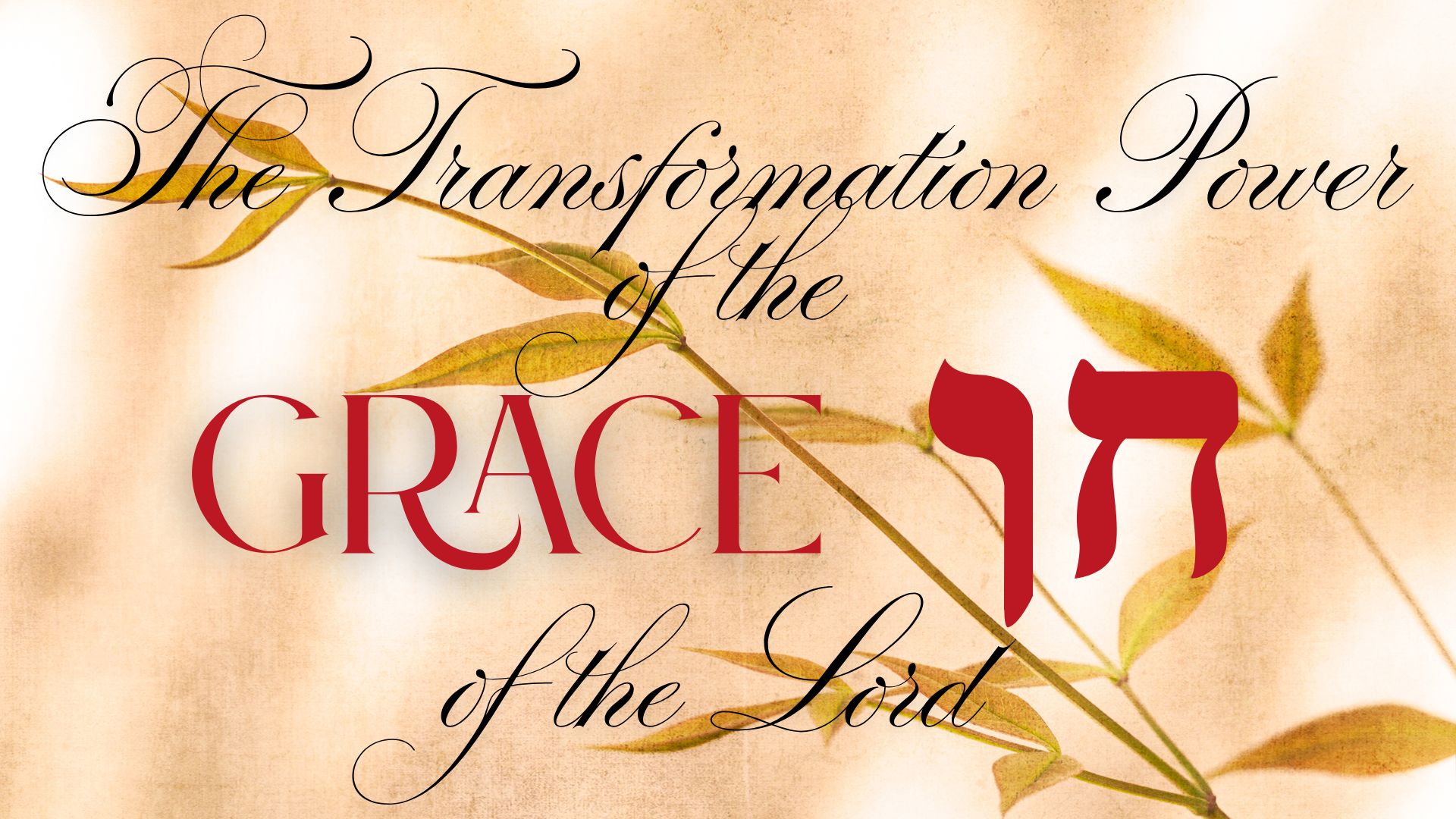
And He said, “I Myself will make all My goodness pass before you and will proclaim the name of the LORD before you; and I will be gracious to whom I will be gracious and will show compassion to whom I will show compassion.” (Exo 33:19, NASB)
Giving Opportunity Message
One of the most powerful elements of God’s Glory is His grace. When Moses, who was the representative of God in the earth, asked to see the Kavod, the Glory of God, God responded with a fourfold response, one part of which was His grace. Grace is part of the Glory of God. His Glory is who He is. Glory is another word for reputation, how one is known!
Yeshua prayed in John 17:1-3:
“Jesus spoke these things; and raising His eyes to heaven, He said, “Father, the hour has come; glorify Your Son, so that the Son may glorify You, just as You gave Him authority over all mankind, so that to all whom You have given Him, He may give eternal life. “And this is eternal life, that they may know You, the only true God, and Jesus Christ whom You have sent.” (John 17:1-3, NASB)
“Glorify your son”. The cross is about to become how Yeshua is “known”. In turn, the cross also reveals the heart of the Father, His Glory! Knowing God and who He is opens up eternal life. Knowing Him is different than knowing anyone else. To “know” Him is to be one with Him and be transformed in that knowing.
Looking at the ancient Hebrew word picture for grace helps open up this understanding.
The Hebrew word translated as grace is חן (hhen, Strong's #2580) and is a two-letter parent root. In order to uncover the original meaning of this word, it is important that we first examine each of the roots and words that are derived from this parent root.
From חן (hhen) comes the verbal root חנה (Hh.N.H, Strong's #2583), spelled exactly the same except with the addition of the letter ה (h) at the end. The following verse provides a good example of the meaning of this verb.
And Isaac departed thence, and pitched his tent in the valley of Gerar, and dwelt there. (KJV, Genesis 26:17)
This verb means "to pitch a tent" or "to camp." The noun derived from this verb is מחנה(mahhaneh, Strong's # 4264).
And it came between the camp of the Egyptians and the camp of Israel; and it was a cloud and darkness to them, but it gave light by night to these: so that the one came not near the other all the night. (KJV, Exodus 14:20)
When we think of a camp, we think of tents scattered about in a general area, but the camps of the Ancient Hebrews were a little different.
The tents were set up in a sort of circle, and these tents serve as a "wall" separating the inside of the camp from the outside. At this point, it would be helpful to examine the pictographic Hebrew script that was used to originally write the word חן (chen). The first letter is the letter chet, which was written as and is a picture of a wall and having the meaning of "separation" as the wall separates the inside from the outside. The second letter is the letter nun, which was written as and is a picture of a sprouting seed having the meaning of "continue" as the seed continues a lineage to the next generation. When these two letters are combined, they mean "the wall that continues." The tents in the picture above are a wall that continues around the camp.
A second verbal root derived from the parent root חן (hhen) is חנן (Hh.N.N, Strong's #2603), spelled the same except with the addition of the letter ן (n) at the end. This verb is often translated as "to be gracious" or "have mercy," however, these are abstract terms and do not help us understand the meaning of this verb from a Hebraic perspective, which always relates words to something concrete. One of the best tools to use to find the more concrete meaning of a word is to look at how that word is paralleled with other words in poetical passages. In the following verses the translation of the verb חנן (Hh.N.N) will be underlined and the word that it is paralleled with will be in bold.
“Be gracious to me, LORD, for I am frail; Heal me, LORD, for my bones are horrified.” (Psa 6:2, NASB)
““Hear, LORD, and be gracious to me; LORD, be my helper.”” (Psa 30:10, NASB)
“But You, LORD, be gracious to me and raise me up, That I may repay them.” (Psa 41:10, NASB)
Be gracious to me, God, be gracious to me, for my soul takes refuge in You; And in the shadow of Your wings I will take refuge Until destruction passes by.” (Psa 57:1, NASB)
“Turn to me and be gracious to me; Grant Your strength to Your servant, And save the son of Your maidservant.” (Psa 86:16, NASB)
Through this process we find that this Hebrew verb is paralleled with such ideas as healing, help, being lifted up, finding refuge, strength and salvation (literally rescue). From a concrete Hebraic perspective, חנן (Hh.N.N) means all of this, which we can sum up with "providing protection." Where does one run to for protection? The camp, and now we see how חנה (Hh.N.H), the camp, and חנן (Hh.N.N), protection, are related. Now we need to see how these words are related to the parent root חן (hhen).
“A gift is like a precious stone in the eyes of him who has it; wherever he turns, he prospers.” (Pro 17:8, AFV)
In this verse, the Hebrew word חן (hhen) is translated as "precious," something of beauty and value.
“A gracious woman attains honor, And ruthless men attain riches.” (Pro 11:16, NASB)
In this verse the "grace," or "beauty," of the woman is contrasted with the strength of a man.
“Favor is deceitful, and beauty is vain; but a woman who fears the LORD, she shall be praised.” (Pro 31:30, AFV)
Again, this Hebrew word is being paralleled with "beauty." This "beauty" is something that is precious and graceful, which is exactly how the Hebrews would have seen the "camp of protection," a graceful and precious place.
All of this points us to grace as the beautiful place of protection where the seed or destiny is nurtured. God is telling us that He has a destiny for us and He Himself is our shield, our deliverer.
Now, the question is, how do we activate grace in our lives?
Let’s look at one of the first uses of grace in the bible:
“But Noah found grace in the eyes of the LORD.” (Gen 6:8, NKJV)
Grace, Chen is “found in the eyes of the Lord”. In Hebrew, the phrase is “motze chen b’enayim Yahweh”. This tells us that grace is found in relationship. It is primarily about a perception. In the case of Noah, God saw something about Noah that was pleasing to Him. This is called grace. God sees a beauty in Noah and He protects that which He sees.
The eyes are the windows of grace. Grace opens our eyes to love. The Apostle tells us that we are saved by grace.
“For by grace you have been saved through faith; and this is not of yourselves, it is the gift of God;” (Eph 2:8, NASB)
God sees our faith, our trust in Him and it is beautiful to Him and the result is our salvation. There is nothing more precious to God than our trust in Him. That’s why it says:
“And without faith it is impossible to please Him, for the one who comes to God must believe that He exists, and that He proves to be One who rewards those who seek Him.” (Heb 11:6, NASB)
This describes grace perfectly. Our trust, our faith pleases Him. It releases salvation, the covenant wall that guards the seed of our destiny.
Now we can understand that grace is based on seeing. God sees our trust; it is beautiful to Him. This is why He gives grace to the humble and opposes the proud.
“But He gives a greater grace. Therefore it says, “GOD IS OPPOSED TO THE PROUD, BUT GIVES GRACE TO THE HUMBLE.” Submit therefore to God. But resist the devil, and he will flee from you.” (Jas 4:6-7, NASB)
Ultimately grace is part of the Glory of God. He told Moses that He would be gracious to who He would be gracious to. In some ways this could sound like God is playing favorites. But the truth is that God extends the invitation to all. We determine who He will release His grace to by our trust in Him.
This is the secret of covenant, of oneness. When we surrender ourselves in love then He reciprocates. This opens our eyes to the beauty of who He is and He sees us with the eyes of beauty. Next time we will look at opening these eyes of our heart.
Activation: It is our trust that is beautiful to God. This is what He meant, I think when He said that man looks on the outer appearance, but He looks on the heart.
“But the LORD said to Samuel, “Do not look at his appearance or at the height of his stature, because I have rejected him; for God does not see as man sees, since man looks at the outward appearance, but the LORD looks at the heart.”” (1Sa 16:7, NASB)
Our heart is His treasure. What do we need to trust Him for? Ask Him to reveal that and allow His grace to flow in your life. Pride is the opposite of grace. The need to do it on our own comes into conflict with the more excellent way of grace. Ask Him to reveal the places where the stench of pride is blocking the power of grace and surrender to Him. We all have places of weakness where we need His grace.
Related
Testimonials
Nancy L
Nancy L
Heading
To add this web app to your homescreen, click on the "Share" icon
![]()
Then click on "Add to Home"

To add this web app to your homescreen, click on the "Share" icon
![]()
Then click on "Add to Home"

It looks like your browser doesn't natively support "Add To Homescreen", or you have disabled it (or maybe you have already added this web app to your applications?)
In any case, please check your browser options and information, thanks!
It looks like your browser doesn't natively support "Add To Homescreen", or you have disabled it (or maybe you have already added this web app to your applications?)
In any case, please check your browser options and information, thanks!




Comments for